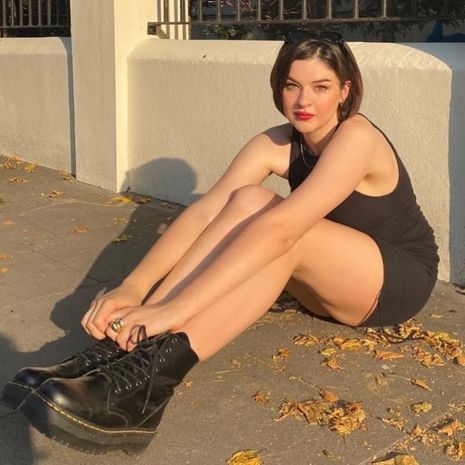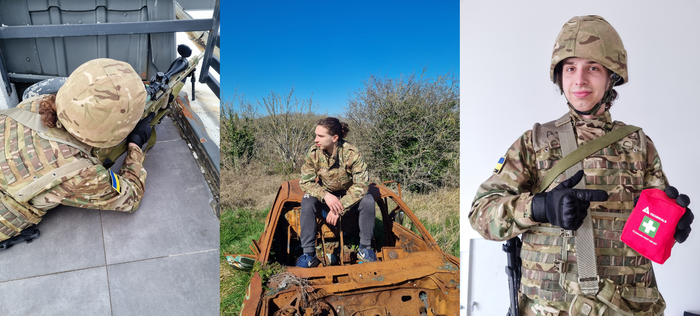Alexandra Sive on her battles with mental health, intermission and journey to recovery
Former Cambridge student and YouTuber Alexandra Sive shares an insight with Bella Shorrock about the balance between student life and mental health – and her advice on recovery

“I spent so long trying to create a self that was as likeable as possible, and I really don’t care so much about that anymore.”
I first came across Alexandra Sive’s YouTube videos in 2019, amidst the whirlwind of university applications. I wanted to go to Cambridge; but having struggled with mental health issues for some time, I was worried about how I would cope in such an intense environment. Alex’s videos reassured me that applying was the right thing to do. They document her life as a student at Sidney Sussex; largely mundane details of her everyday experience, but imbued with a kind of ethereal quality by her magnetic presence and the soft piano music in the background. In the videos, she talks candidly about mental health and the pressures faced at Cambridge including her decision to intermit in third year.
Underlying mental health issues on my part spiralled at the beginning of 2020. Having received a place to study HSPS at Cambridge for 2020 entry, I was forced to defer it. I had become pretty unwell, mentally and physically.
Once again, I turned to Alexandra. She’s stopped posting on YouTube. But, after some time away from social media, her posts (curated to dark academic perfection) have returned. And she exudes a self-assured confidence – staring at the camera with a doe-eyed gaze from among folds of tulle or sipping coffee on a Parisian balcony. Having arrived at Cambridge, I was inspired by her new-found confidence, and reached out to ask if she would sit down with me to talk about Cambridge, mental health, and eating disorder recovery — and she agreed. Here’s our conversation.
“Giving myself the space to recover allowed me to flourish in my final year and beyond”
You had to intermit in your third year due to illness. How hard was it, making the decision?
It was really hard. I felt like I was admitting defeat and retreating, but in reality, I was winning a battle against my own obstinance, because I was really physically unwell. Giving myself the space to recover allowed me to flourish in my final year and beyond. I’m so glad I intermitted, it was such a good decision for me.
It can be difficult balancing mental wellbeing and the intensity of Cambridge life. As a fresher, halfway through my second term, I’ve found it can be incredibly isolating. Did you manage to achieve a balance?
Sometimes I managed it, and sometimes I didn’t. There were lots of moments where I felt completely overwhelmed. I think the main thing is not to be too hard on yourself – everyone feels overwhelmed sometimes, and so many people struggle with impostor syndrome. If you miss an essay deadline, or a night out, or an extracurricular meeting because it’s what you need, so be it. Your university experience and your grades won’t suffer from the occasional breather.
If it’s happening a lot though, I would definitely talk to someone. Whether it be friends, your tutor, your DoS, the college nurse or counsellor – ideally a few different people. Across all the available sources, you will be able to find someone to go to when things feel too much.
“perfection is a myth, because it assumes a single point where all desirable traits converge”
You’ve been outspoken about your mental health struggles when you were a Cambridge student and since. How did you manage in such a high-pressure environment?
I learnt to manage it by doing the really basic stuff that everyone tells you to do, but you avoid doing because it feels like it couldn’t possibly help with something so overwhelmingly hard. I went to therapy, I made sure to eat properly, I tried to get outside every day. I also finally found a therapist who I really got on with, and started taking medication, which I was extremely hesitant about, but it helped hugely.
Cambridge is super high pressure, and it’s hard not to overwork yourself in the face of perfectionism. But I realised after intermission that perfection is a myth, because it assumes a single point where all desirable traits converge. But we all have different traits, and their non-convergence is where creativity, interest, real beauty and intelligence actually exist. Better to be gentle and kind and make things in the world, than to be brutal and stuck in an unending battle with yourself.
Can you talk a bit about your recovery journey?
The January of my first year at Cambridge was when I decided to recover from anorexia in earnest. Recovery is not a straight line, and I did struggle with body dysmorphia and periods of restriction throughout university.
An injury I had sustained when I was fifteen worsened in 2020. I couldn’t exercise – so the weightlifting and running that were the last stronghold of my disorder were taken away. Watching my body change so much was hard in some ways, but nearly 40kg later, my life has only become better. However my body looks when I’m doing what feels good is exactly how I want my body to look.
We’ve never met - but just from looking at your recent posts and captions, you seem so self-assured. So happy. What’s changed?
I feel a lot more self-assured, partly because I know myself a lot better now. I stopped making decisions based on what I thought people wanted from me. I spent so long trying to create a self that was as likeable as possible, and I really don’t care so much about that anymore. That said, life moves in waves, and it’s not like you’ll one day reach a place where the tides stop and you’re radiantly happy forever. You just learn to swim.
 News / Hundreds of Cambridge academics demand vote on fate of vet course20 February 2026
News / Hundreds of Cambridge academics demand vote on fate of vet course20 February 2026 News / University Council rescinds University Centre membership20 February 2026
News / University Council rescinds University Centre membership20 February 2026 News / Judge Business School advisor resigns over Epstein and Andrew links18 February 2026
News / Judge Business School advisor resigns over Epstein and Andrew links18 February 2026 News / Petition demands University reverse decision on vegan menu20 February 2026
News / Petition demands University reverse decision on vegan menu20 February 2026 News / Caius students fail to pass Pride flag proposal20 February 2026
News / Caius students fail to pass Pride flag proposal20 February 2026










